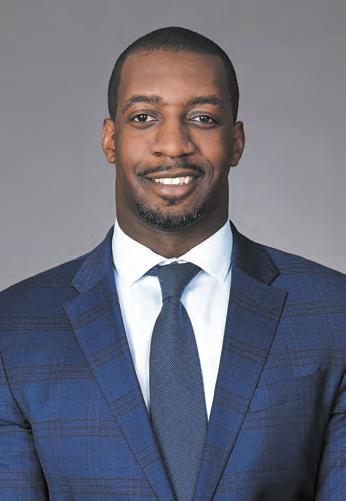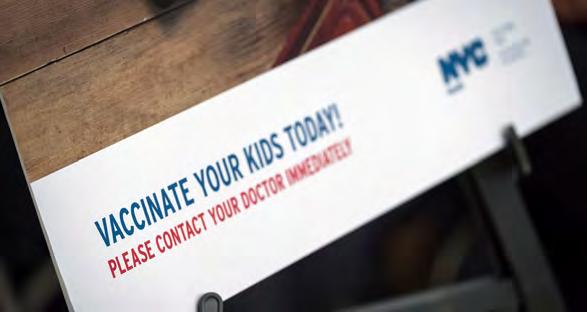
6 minute read
Health
Dr. Torian Easterling reflects on his legacy at the NYC Department of Health and Mental Hygiene
By HEATHER M. BUTTS, JD, MPH, MA
Special to the AmNews
Dr. Torian Easterling, the outgoing first deputy commissioner and chief equity officer for the New York City Department of Health and Mental Hygiene, spoke with the Amsterdam News for a Q&A on the work he has done while at the Department, and the challenges New York still faces. This interview has been edited and condensed for clarity.
AmNews: Please tell us about your thoughts as you look back on your time and accomplishments with the New York City Department of Health and Mental Hygiene?

As I look back on the last seven-and-a-half years during my tenure at the New York City Health Department of Health and Mental Hygiene, it’s been an incredible opportunity, an opportunity of a lifetime. I’m a family physician, public health physician, who initially thought that I would practice and hang up my shingle and see patients in northern New Jersey, and then got focused on community health…Black and brown communities that have been marginalized [and] disproportionately impacted for decades…the best way to describe some of the accomplishments here at the Health Department—for one I think it has been a major accomplishment and an opportunity to work under major leaders who have championed equity and really focus their investments in neighborhoods during my time.
When you do a scan across this country you look at public health departments and certainly one that is as large as ours, to be bold about talking about structural racism, to be bold about making specific investments in neighborhoods like South Bronx, Brownsville, East Harlem, and saying I’m going to put millions of dollars into these communities, not just on staff but brick and mortar on-site programs, and say to our partners we need to work with, we cannot meet our goals unless we work with them, and so that’s how I got to the health department back in 2015. A commitment to working in the neighborhoods that I just referenced and so many more, and that’s the work that I’ve been doing over the last seven and a half years.
When we think about the data and what we’re seeing in Black and brown communities, the homicide rate due to gun violence of young men between ages of 18 and 44…the ongoing inequities around infant mortality… We’re still seeing these persistent inequities and Black women dying during childbirth in New York City compared to white women…somehow we are not making enough noise about that…the work that we were doing in Brooklyn was supporting a lot of the partners who’ve been working for more than two decades in this city and really trying to close the gap around maternalistic health outcomes and also expanding our investment in doula services…We have significantly grown [doula services] by starting A Healthy Start which funded team-based organizations…so we were having doula services in Staten Island and Queens working with a number of different organizations now under the Adams administration. I’m extremely grateful around the chronic disease prevention. We did a lot around expanding access.
D r . T ori an Easterling (Photo courtesy of the NYC Dep t. o f Hea l t h)
AmNews: Are there any challenges you still feel need to be overcome?
I think the work of continuing to operationalize what it means to do equity not only in New York City but across the country, that’s our ongoing work and this is going to be long-term work. I lift it up because I want to ensure that…the achievements that we’ve made so far, we’re talking about 400 years of hardship for Black and brown folks in this country…this is a very young country and so the original sin of racism still is pervasive in our country in our society, so there’s a lot of work that we have to do to make sure that we do not just rely on what’s easy, to make decisions on what’s easy and what’s already set up.
We certainly had to be really mindful about that during our COVID response when we talk about vaccine equities.
AmNews: Where are you headed and where will the future take you?
I’m certainly looking forward to resting and relaxing with my family. Into the future is to be determined, there are lots of opportunities and possibilities. I hope to keep growing professionally and keep working in public health administration. There’s so many organizations and institutions who have committed to really growing equity investments and whether that’s a foundation or a healthcare system or academia, I think it’s really important making sure that I’m going to be working in an institution where there’s a real commitment to advancing health equity, that we’re not just giving lip service but that we are also saying to our own staff that we have to figure out what are the mistakes that we’ve made and how do we transform our own organization.
Health commissioner Ashwin Vasan talks polio vaccines with the NY Amsterdam News
Sign asking parents to vaccinate their kids Sign asking parents to vaccinate their kids (Ed Reed/Mayoral Photography Office)
By TANDY LAU
Amsterdam News Staff, Report for America Corps Member
With spooky season in full swing, polio is back from the dead after a reported case in Rockland County earlier this year, with evidence of the disease spreading through greater NYC-area wastewater soon after. Over email, NYC Department of Health and Mental Hygiene Commissioner Ashwin Vasan answered questions about the resurgence of the life-threatening virus—and it’s a personal matter.
“I know firsthand how polio robs people of their lives,” he said. “My father’s older sister was an aspiring doctor when she died of the disease in India in the 1950s. My father’s younger brother is a polio survivor and his daily life is a reminder of the effects of the disease. He is paralyzed on one side of his lower body. That was not my reality since I was vaccinated against the virus as a baby.”
Vasan urges parents to get children vaccinated ASAP. He says the city is prioritizing getting kids under 5 their shots “without delay.” It’s typically a four shot process starting from a newborn’s early months. Chances are grownups are good, as the vaccination is mandated for schools in New York as well as across the country. But those unsure should talk to a doctor.
There are city-run clinics where New Yorkers can get themselves and loved ones a shot. Those under four can get the vaccine for low-to-no cost at an immunization clinic at the Fort Greene Health Center.
A myriad of reasons are leading to a quiet return of polio.
“We are seeing polio reappear in countries that we thought had eradicated it [due to] the combined effect of global under-vaccination that was created by a combination of mistrust and misinformation, amplified by social media; poor implementation of vaccination programs in other parts of the world; lack of access in conflict zones, insufficient funding, and work suspended because of the COVID-19 pandemic,” said Vasan.
According to the CDC, the vaccine is 99-100% effective against polio after three doses. The lone person to contract polio this year in New York was unvaccinated.
Last month, Gov. Kathy Hochul declared an emergency over polio in hopes of reaching the unvaccinated and under-vaccinated. Her executive order expanded vaccine administration permissions to EMS workers, midwives and pharmacists. According to Hochul’s office, polio was declared eliminated in the United States back in 1979.
“People are leading safer lives because of the polio vaccine and other important vaccinations and it’s more important than ever to renew confidence in one of the greatest marvels of human ingenuity and public health: vaccines,” said Vasan. “Please get vaccinated today.”
Polio vaccine appointments can be made on https://vaccinefinder. nyc.gov

Tandy Lau is a Report for America corps member and writes about public safety for the Amsterdam News. Your donation to match our RFA grant helps keep him writing stories like this one; please consider making a tax-deductible gift of any amount today by visiting: https://bit.ly/amnews1










